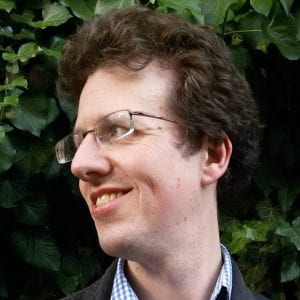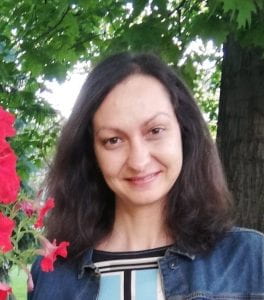Магистърска програма: ЕЗИК И КУЛТУРА (Английски език)
Срок на обучение: 3 семестъра
Форма на обучение: редовна
Ръководители на програмата: проф. д-р Корнелия Славова, проф. д-р Александра Багашева
Тел. 02 946 3094 (Катедра Англицистика и американистика)
e-mail: kornelias@abv.bg; abagasheva@gmail.com
Програмата предлага специализирана професионална подготовка по широк спектър от лингвистични и социокултурни дисциплини, свързани с общуването на английски език в съвременния свят. Тя е интердисциплинарна и цели да осигури знания и практически компетентности по език, междукултурна комуникация и англоезични култури и литератури, където англо-американският опит предлага водещи модели. Програмата развива у студентите критично мислене и аналитични умения за работа на ниво текст, както и визуални, графични, и културни практики, отговарящи на нуждите на съвременното общество – особено в сферата творческите и културните индустрии.
Програмата е гъвкава и се предлага на бакалаври от различни области на знанието: кандидати завършили „Английска филология” или други нефилологически направления, които желаят да повишат образователната си степен и да се специализират по лингвистика и англоезична култура и литература. За кандидатите с нефилологическа подготовка се предвиждат допълнителни курсове по езика и базови филологически знания и умения, които подготвят включването им в основния курс на обучение.
Принципът за гъвкавост на обучението позволява на студентите да избират лингвистични и културологични курсове, като спазват изискванията за броя кредити, които трябва да наберат от задължителните и избираемите дисциплини. Някои от курсовете се предлагат в е- формат, което дава допълнителни възможности на студентите да организират своя учебна програма.
Обучението е изцяло на английски език и е отворено към чуждестранни студенти.
Магистрантите могат да участват в програмата за студентски обмен ЕРАЗЪМ и да набавят част от необходимите кредити от университети в други страни.
Магистърска степен се получава след успешна защита на дипломна работа на английски език.
Дипломираните магистри от програмата могат да се реализират като:
преподаватели в общообразователни и специализирани средни училища, колежи и университети; специалисти и консултанти по лингвистика, чуждоезиково обучение и комуникации; специалисти по литературата, езика, културата и обществата на Великобритания и САЩ в сектора на културните и творчески индустрии (рекламни дейности, медии, културни институти и форуми, и др.); служители в държавната администрация с висока компетентност по английски език; експерти в европейски и международни културни и образователни институции; наши и чужди неправителствени организации; журналисти, работещи по проблемите на Великобритания и САЩ; сътрудници в наши и чуждестранни компании; издателска и библиотечна дейност.
Всички кандидати за програмата се явяват на интервю. Бакалаврите-нефилолози представят и мотивационно писмо на английски език (около 2 стр.) с мотивите си за избора на програмата и направленията от нея.
Програмата се предлага за кандидати с придобита образователно-квалификационна степен „бакалавър” по направление 2.1- Филология, наричани „Специалисти” , както и за бакалаври от други/ нефилологически направления, наричани „неспециалисти”.
Студентите – неспециалисти следва да наберат 15 кредита от задължителните курсове на Подготвителния модул.
2 кредита = 30 часа аудиторна заетост и 30 ч. извънаудиторна заетост + 1 кредит – самостоятелна работа
Студентите набират определен брой кредити от самостоятелна работа, напр. защита на курсова работа, автореферат, изработване на корпус, теренно изследване, портфолио, рецензиране на научен труд или художествена творба и т.н.
При завършване всеки студент трябва да е набрал следния брой кредити:
Неспециалисти: задължителни 45 кредита (от които 15 кредита от подготвителния модул); избираеми – 30 кредита; защита на магистърска теза – 15 кредита;
Специалисти : задължителни 30 кредита; избираеми – 45 кредита; защита на магистърска теза – 15 кредита.
Учебните занятия се провеждат в два дни от седмицата – петък и събота.




